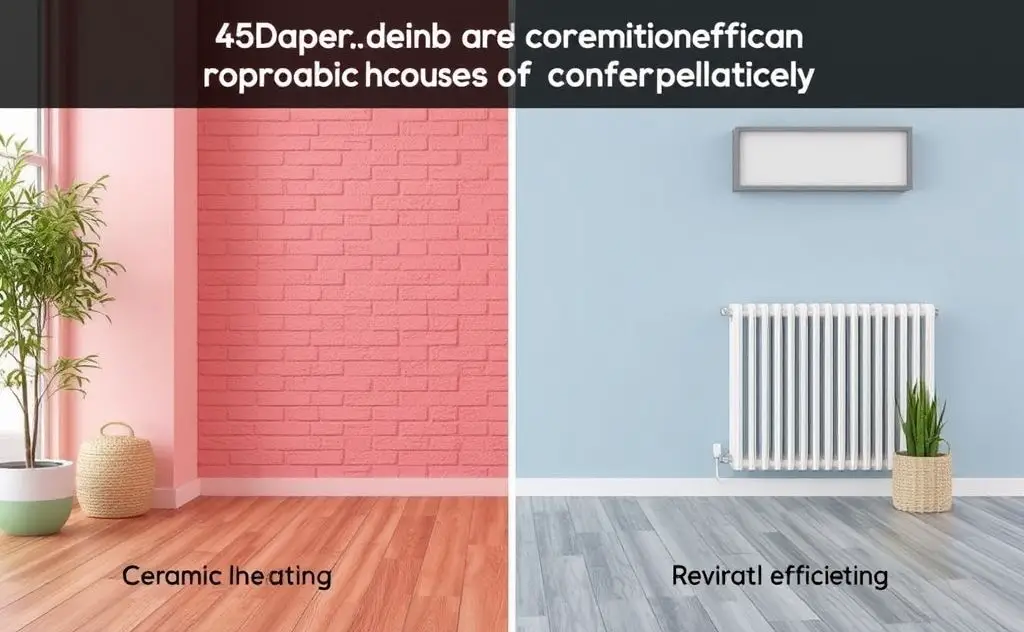Ceramic heaters provide efficient, direct heat using ceramic elements, while radiant heaters emit infrared heat for broader warmth; both serve distinct heating needs.
Choosing between ceramic and radiant heaters can be confusing. Both offer unique benefits for different heating needs. This guide breaks down their differences to help you make an informed decision.

How Ceramic Heaters Work
Ceramic heaters use convection heating. They warm air that circulates through the room. Here’s the process:
- Electricity heats ceramic plates or coils
- A fan blows air across the heated elements
- Warm air spreads throughout the space
Types of Ceramic Heaters
- Fan-forced models: Use fans for faster heat distribution
- Baseboard models: Silent operation with natural convection
For modern designs, check out these stylish ceramic heater options.

How Radiant Heaters Work
Radiant heaters use infrared technology to directly warm objects and people. They don’t rely on air circulation.
| Feature | Radiant Heater |
|---|---|
| Heating Method | Infrared waves |
| Heat Direction | Direct line of sight |
| Room Warming | Spot heating |
Key Differences
Energy Efficiency
Radiant heaters are 100% efficient – all energy converts to heat. Ceramic heaters lose some energy through air circulation.
Heating Speed
Radiant heaters provide instant warmth. Ceramic models take time to warm up the air.
Noise Level
Most radiant heaters operate silently. Ceramic heaters with fans can be noisy.
Room Coverage
Ceramic heaters better distribute heat throughout a room. Radiant heaters focus on specific areas.
Best Uses for Each Type
When to Choose Ceramic
- Whole room heating
- Spaces where noise isn’t an issue
- Areas needing consistent temperature
When to Choose Radiant
- Spot heating needs
- Silent operation required
- Outdoor or drafty spaces
For outdoor use, consider these top-rated outdoor ceramic heaters.
Safety Considerations
Both types have safety features:
- Ceramic: Cool-touch surfaces, tip-over switches
- Radiant: Protective grills, automatic shut-off
According to Green Wave Distribution, ceramic elements don’t get as hot as other heating elements, reducing fire risk.
Cost Comparison
Initial costs vary:
- Basic ceramic heaters: $30-$100
- Basic radiant heaters: $50-$150
- High-end models: $200+ for both types
Operating costs depend on usage. Radiant heaters may cost less for spot heating.
Maintenance Needs
Ceramic heaters require more maintenance:
- Regular filter cleaning
- Fan maintenance
- Dust removal
Radiant heaters need minimal upkeep – just occasional surface cleaning.
Special Features
Modern heaters offer advanced options:
- Programmable thermostats
- Remote controls
- WiFi connectivity
- Oscillation
As noted by Custom PC Guide, some radiant heaters now include smart features for remote control.
Environmental Impact
Both types have pros and cons:
- Ceramic: May circulate dust and allergens
- Radiant: Doesn’t disturb air particles
- Both: Electric models produce no emissions
Durability
Quality varies by brand, but generally:
- Ceramic heaters last 5-10 years
- Radiant heaters last 7-15 years
Higher-end models from reputable brands tend to last longer.
